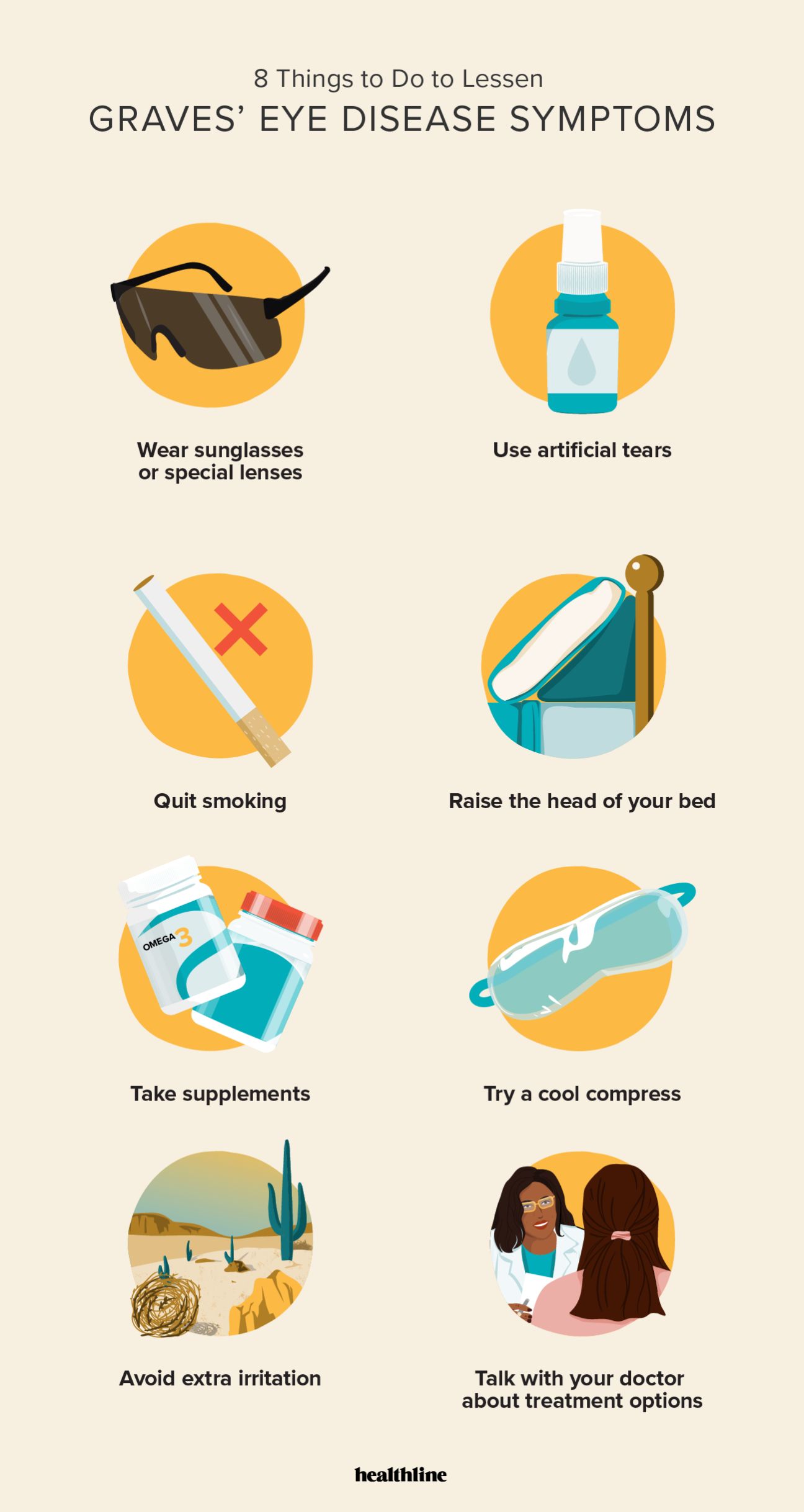Graves’ eye disease can cause swelling, dryness, and irritation, but there are ways to cope with the discomfort.
Graves’ disease is an autoimmune disease in which the immune system attacks the thyroid gland, causing it to make extra thyroid hormone. This causes symptoms such as sweating, feeling weak, a rapid or irregular heartbeat, and mood changes.
In most cases, symptoms are mild and will resolve on their own. Here are some things you can do to manage the discomfort of Graves’ eye disease.
Graves’ eye disease can make your eyes
Wear sunglasses outside, even if it’s not completely sunny. Depending on the indoor lighting of your office or other places you go, you may also want to wear sunglasses inside.
Have several pairs of sunglasses so you’ve always got a pair with you. Choose wraparound sunglasses that offer full protection to the front and sides of your eyes.
You may develop double vision if swelling around your eye limits how well your eyes can move. Your eyes may no longer be aligned, which can cause double vision. Your eye specialist may recommend glasses with a prism in them to correct double vision.
Dry eyes can be a major issue for people with Graves’ eye disease. Your eyes can dry out easily if your eyelids are pulled back from the surface of your eye. Inflammation around your eye can also affect tear production.
Your eyes may feel gritty as if you have sand in them. You might also feel stinging or burning.
Try using artificial tear drops to manage symptoms of dry eyes. If that’s not enough, consider gel drops. These are thicker and provide more protection. Gel drops are great to use before bed to keep the surface of your eye from drying out overnight, especially if your eyelid can’t fully close.
Smoking is associated with a
If you smoke, try to cut down or quit smoking. This can feel impossible, but some things can help. Consider
A buildup of fluid around your eyes can cause pain and swelling. This puts pressure on your eye and can make symptoms worse. Lying flat at night can cause extra fluid to collect around your eyes.
Try raising the head of your bed. You can buy wedges or risers that go under the top legs of your bed. You can also use a firm wedge pillow or a mattress wedge to keep your head above the rest of your body.
Selenium is a natural mineral in foods such as nuts, fish, seafood, meat, and poultry. It’s an antioxidant, which may help reduce inflammation in Graves’ eye disease.
The American Thyroid Association and the European Thyroid Association recommend that people with mild Graves’ eye disease take 100 micrograms of selenium twice daily for 6 months. Some 2021 research has found that selenium can improve symptoms and
Vitamin D is another supplement that may be helpful for people with Graves’ eye disease. There’s a possible link between vitamin D and autoimmune conditions, which is what Graves’ disease is.
In a small 2019 study of people with Graves’ eye disease, 20% had vitamin D deficiency. It’s possible that vitamin D could help slow the progression of Graves’ eye disease. Ask your healthcare team about getting your vitamin D levels checked and whether a supplement may help.
A cool compress can soothe swollen, irritated eyes. You can use this as needed to relieve pain and discomfort.
If you buy a cooling gel eye mask, follow the instructions on the package on how to use it. You can also make a cool compress at home. To do this, wet a small towel or cloth. Wring out the excess water, put it in a plastic bag, and keep it in the freezer for a few minutes.
Before you place it on your eyes, make sure it’s not uncomfortably cold. You don’t want to damage your skin.
When your eyes are already irritated, certain conditions can make them feel worse. Strong winds, air conditioning, and cold winter air can dry your eyes even more.
Consider wearing wraparound sunglasses on windy days to help protect your eyes from the wind and any dust or grit that might blow into your eyes.
In the summer, aim the air conditioning vents in your vehicle away from your face. In the winter, limit your time outside on very cold days or use glasses or goggles to protect your eyes.
Thyroid hormone levels that are too high or too low may make your eyes feel worse. Take medications and get blood work according to your care plan.
Stay in touch with your healthcare team and let them know of any changes to your symptoms. There may be other treatments that could be helpful.
Most of the time, symptoms of Graves’ eye disease are mild and will resolve on their own, usually within
About
Graves’ disease can affect the eyes, causing dryness and irritation. There are things you can do to help manage your symptoms, and it’s important to follow up with your healthcare team. Most of the time, symptoms are mild. For more severe cases, you may need medication or surgery.






